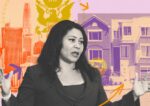Mayor London Breed took to the stump to trumpet Proposition C, a measure to scrub San Francisco’s transfer tax for office-to-home conversions.
Breed and other city leaders gathered in Japantown over the weekend to launch the campaigns for Prop. C and two other ballot measures they hope will help revitalize Downtown, the San Francisco Standard reported. Voters will decide the fate of the measures in March.
To pare down the city’s soaring office vacancies and encourage new homes, Breed last fall had pitched the measure to waive the city’s transfer tax for office buildings that are converted to homes.
The other two ballot measures to boost the prospect of Downtown include Proposition E, which would allow police to use technology to crack down on crime, and Proposition F, which would require residents eligible for general assistance to go through drug screening and treatment.
The three ballot measures are among seven that will be decided during the March 5 presidential primary election. Breed is up for re-election in November.
“These are the kinds of things we need to do to focus on public safety, to focus on the challenges around drug dealing and to build more housing,” the mayor told a Saturday crowd of hundreds of supporters.
She was joined by Supervisors Matt Dorsey and Rafael Mandelman, state Sen. Scott Wiener, City Assessor-Recorder Joaquin Torres and others.
Prop. C, which would waive the tax for transferring properties from office to residential use, would entice developers to repurpose millions of square feet of vacant offices in Downtown, according to the campaign.
Property owners pay the transfer tax when a building is sold. The tax rate for properties more than $10 million is 5.5 percent to 6 percent, the highest rate for any big city in the state.
Developers say the tax burden makes it hard to get financing from investors because of the potential hit to returns when the building is sold.
Breed’s ballot measure would limit the tax waiver to 5 million square feet of converted office space, or 5.7 percent of the city’s offices. The city’s office vacancy rate hit a new record last month of 35.9 percent, while the volume of empty offices climbed to 31.5 million square feet.
To get the tax waiver, the conversion would have to be approved by the Planning Department by the end of 2029.
“We need to acknowledge the economic realities of these office buildings Downtown,” Weiner said.
“We need to make sure that people are able to come in and do what they need to do with those buildings and convert them into housing so that we don’t have our taxes get in the way of those changes we need.”
— Dana Bartholomew
Read more



